|
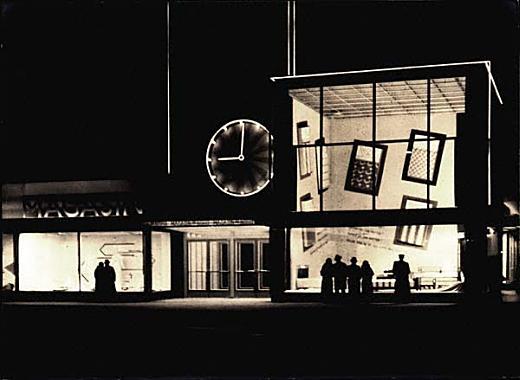
Magasin du Nord of Copenhagen
An Eye for the World
Shotaro Shimomura
1934-1935
The American Museum of Photography
_______________________
Dew Light
W. S. Merwin
Now in the blessed days of more and less
when the news about time is that each day
there is less of it I know none of that
as I walk out through the early garden
only the day and I are here with no
before or after and the dew looks up
without a number or a present age
The American Poetry Review
November/December 2010
_______________________
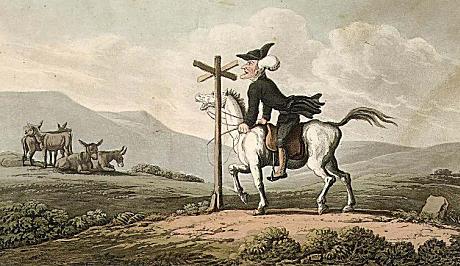
“Doctor Syntax Losing His Way.”
Thomas Rowlandson
Syntax Lost in the Forest
Tom Clark
(....)
We like Syntax may have often been blind and vain
in our persistent foolish quest for a picturesque element
in the stark and grim picture of actuality:
this element is the dream of almost-reason which language constructs for us,
employing its misguiding signs to divert us toward impossible pleasures,
advertising its illusionary rest stops to deceive us into thinking there is relief to be found,
offering its delusive pretences to a destination
when the real world contains no such convenient thing,
only more of the same, more of the going on,
more of the stupid expectation of some meaningful conclusion,
some sensible and pleasing shape to the whole project,
which is, with its endless extenuations, its insistent aggravations,
of its nature formless and inchoate,
incapable of being shaped into even the approximate semblance
of the true and credible article, the meaningful tale, the bright history
...(more)
The tour of Doctor Syntax: in search of the picturesque, a poemWilliam Combe illustrations by Thomas Rowlandson Google eBook
_______________________
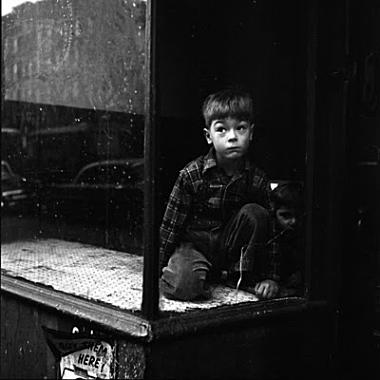
Vivian Maier
1926-2009
Her Discovered Work
curated by John Maloof
A developing picture: The story of Vivian Maier
Mary Houlihan
Finding Vivian Maier
interview with John Maloof
John Maloof - Street Photography
_______________________
In Defense of the Public
Eve Ewing
The schema of capitalism—where the pursuit of private profits is sanctified—has turned Americans shamefacedly away from the public life that is the birthright of all citizens in a democracy.(....)
How can we undo the prejudice against shared public resources that has settled over America’s discursive landscape? To begin with, we need a compelling argument that the public sphere is worth fighting for. We need to cultivate a richer understanding of what public actually means—or what it ought to mean....(more)
_______________________
The Best of Open Culture 2010
_______________________
UbuWeb Top Ten for January 2011
Selected by Paula Scher
_______________________
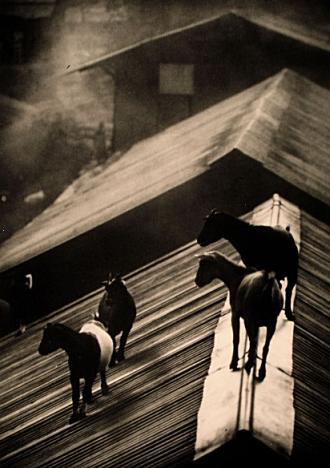
Goats on the Rooftop
Schwitzer's Leper Village
1954
W. Eugene Smith
1918-1978
1 2 3
_______________________
Anarchist Developments in Cultural Studies
No 1 (2010)
Post-anarchism Today
Anarchist Meditations or:
Three Wild Interstices Of Anarchy and Philosophy [pdf]
Alejandro de Acosta
I dare to call certain turbulent interstices of anarchy and philosophy wild. I feel that there is a lot of activity there, but not (yet) along predictable lines. For some time now, those interested have been hearing about several other such interstices: tamer ones, from my point of view. Or at least more recognizable. So let us play the familiar game of theory and practice, that game in which we presuppose them as separate and seek to claim them reunited. From within the play of this game, the tame interstices are variations on the following moves: philosophers allude to anarchist practices; philosophers allude to anarchist theorists; anarchists allude to philosophers (usually in search of theory to add to the canon). What is missing in this schema, I note with interest, is anarchists alluding to philosophical practices. These are the wild interstices: zones of outlandish contact for all concerned, I think.
_______________________

The Walk to Paradise Garden
W. Eugene Smith
1946
_______________________
Charles Greenberg's Hippie Self-Archeology
Charles Greenberg
exquisite corpse
working with the forceps of time
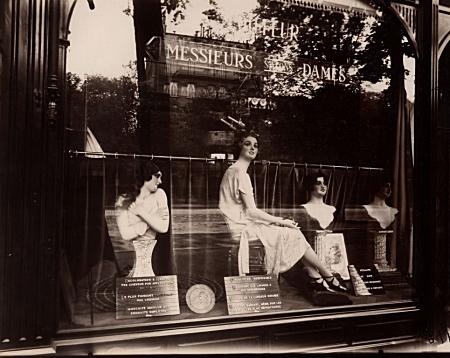
Avenue de l'Observatoire
1926
Eugčne Atget
George Eastman House's photostream
flickr
_______________________
Christmas Chronicles
Selected poems
Paul Durcan
irish times
The Recession
The bank robbers in the Celtic Tiger era –
I do not mean the gentlemen with the sawn-off shot-guns –
I mean the double-vent bonus boys –
Brought a reign of terror into the lives
Of the innocent, the elegant, the confused, the polite
Such as the woman passer-by who this morning stopped me on Duke Street:
“You wouldn’t know me but I knew your father!
I’m 82!
You’re so like him! You’re just so like him!
Isn’t it a simply glorious morning?
And it’s not yet even eleven o’clock!
(Imperious glance at bony wrist) It’s only ten-to-eleven
On a Saturday morning in the middle of December
And the sun beaming like a toddler on a potty!
The Recession! Don’t even say the word.
Don’t utter it.
I lost my pension, the whole jing bang lot
To that gang of tight-bottomed, piotious, creeping Jesuses in Allied Irish Banks.
What does it matter?
I am 82 and I am as new as a snowdrop.
No, not a snowdrop, a sunflower.
I’ve just been looking in the window of CLEO’S in Kildare Street.
Do you know it? She sells Celtic Clothes. A gem of a shop.
She’s got a vase of sunflowers in the middle of the window
And, all around it, garments
Of every hue of gold you have ever seen,
Every lunula, every monstrance.
It could be an altar in St Petersburg, CLEO’S window,
An iconic boutique, all hand-knitted vestments,
The holiness of the soul’s body, no less!
I said to myself: This is ME, this window!
This window is ME!
CLEO’S is ME!
...(more)
_______________________
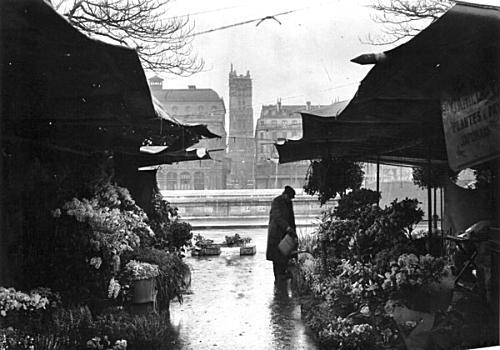
Quai de la Corse and
La Tour Saint-Jacques
Yvon's Paris
Vintage Photographs from the 1920s
_______________________
Weeks is poetic homeopathy: a weak dose of the virus to immunize our systems—let’s say consciousnesses- against it.
What do we make of our everyday lives: make of them, make out of them? What do we make of, that is, these materials that we can no where (not anymore) avoid, avert our ears as we do, or, as in poetic practice, hide behind the suburban laws of laundered lyricism?
Weiner’s Weeks is a shocking cul de sac to a tradition of the found in American poetry—atradition that includes, by any brief accounting, Charles Reznikoff’s Testimony, SterlingBrown’s ethnographic encounters with the black oral tradition, William Burrough’s cut-ups,Jack Spicer’s “received” poems, Jackson MacLow’s processing of source material, or RonaldJohnson’s erasure of Milton in Radi Os; not to leave out Weiner’s own Clairvoyant Journal, where what is found is the words seen (projected? transferred?) onto the objects and bodies surrounding her. Cul de sac not in the sense of “no more to be found,” any more than nomore to be lost. Only that in the world of Weeks there’s no way out and ascent upward is effectively blocked, since Weeks presents a world in which “I went by [can only go by] theinformation I received,” i.e., not very far. What’s left is to descend into this world of “our” very own making, to attend (to) its forms so better to reckon with it. “The standoff began as a botched robbery.”
-
Charles Bernstein
WEEKSHannah-Weiner Scribd
Photos by Barbara Rosenthal, introduction by Charles Bernstein.
This is invisible stuff up there Folks were just lying aroundon the grass This year we have carefully added new titles not previously available to a national audience as well as selecting titles from last year’s list of publishers Does a healthy body mean a healthy mind The Soviets have vastly understated their losses We’ve got nuclear trucking going through our city Ham radio is always used in the initial stages of a disaster There is fear of loss of face and world opinion and the spaceprogram will go on We’re here on 67th St and Lexington Ave. That international aid be allowed into the Ukraine An expert on bone marrow transplant Perhaps he will offer them accessto the American list The documents were found in the national archive in Washington A resistance to the hiring of gays on the part of the membership How do we know some of those haven’t infiltrated the police dept. They’re disgracing thejob The crunch comes when the issue goes public U.S. oil companies or their subsidiaries still pump most of Libya’s oil Radiation clouds dissipating It was a special day for some special dogs We’ll brighten up your patio, shove a couple of creepers up your trellis This was Haiti last February No charge against the former first lady seems too extreme Nice weather, spring, it’s so wonderful Do you know the name of the astronaut who became America’s first man in space It happened today twenty-five years ago Will the 49,000 who hadto be evacuated from the area ever be able to go home again That’s something I can’t give any credence to without aprofessional evaluation A mother and her 13 year old son were both selling drugs This is holocaust remembrance day How big a ransom did the letter ask for _______________________
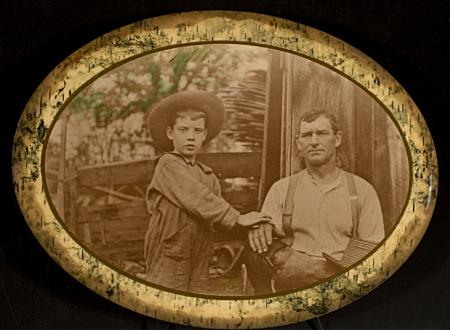
Father and son
ca. 1915
Celluloid Medallions & Buttons
_______________________
Corporeal Order
Chris Martin
exquisite corpse
(....)
No balance, no right angles, no parallel lines, no circles—in effect, no geometry.
Think breath: an inexorable process of regeneration, repetitive yet variable—you breathe and in breathing change, you live and you die, asymmetrically.
Think blood: a ceaseless journey, always forwards but with tiny backwaters—the blood is the medium of the body, its middle ground, it preserves and is replaced, the body and the blood, cell by cell, mutually mutating.
Equilibrium is dependent on sight. Seeing separates, punctuates, isolates, inculcates, abbreviates, obliterates. Seeing creates a form built on edges, a violence of exactness, a knife sense. Equilibrium is impossible without the abstraction of the eye, which cuts at a distance.
Disequilibrium is dependent on nothing short of existence. It privileges touch, the haptic, modes of feeling over modes of seeing. More than touch even it privileges the synesthetic. Disequilibrium incorporates. Disequilibrium interpenetrates. It acts with intimacy, proximity, responsibility.
No hierarchy, only movement. Only becoming. Only of.
...(more)
_______________________
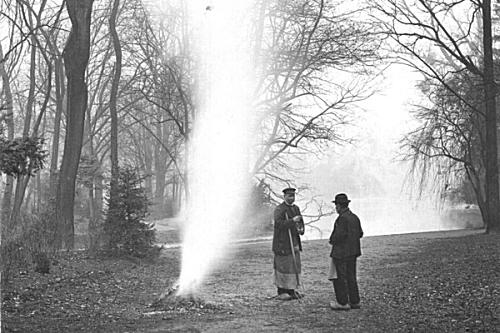
Bois de Boulogne
Yvon
c. 1920s
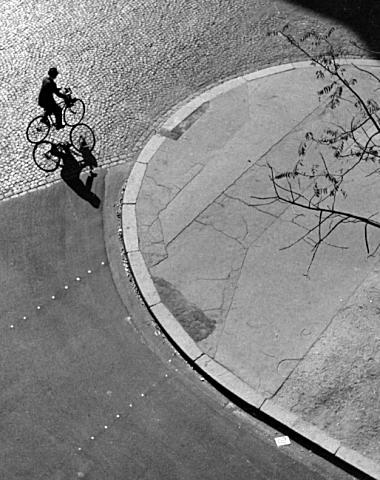
Paris
1948
André Kertész
Pedaling
Bicycle Photographs from Then to Now
Charles A. Hartman Fine Art
June 16 - July 31, 2010
via
_______________________
Kicking Away the Ladder: [pdf]
Neoliberals Rewrite History
Ha-Joon Chang
Monthly Review, Jan2003, Vol. 54 Issue 8
Contrary to the conventional wisdom, the historical fact is that the rich countries did not develop on the basis of the policies and the institutions that they now recommend to, and often force upon, the developing countries. Unfortunately, this fact is little known these days because the “official historians” of capitalism have been very successful in rewriting its history. Almost all of today’s rich countries used tariff protection and subsidies to develop their industries. Interestingly, Great Britain and the United States, the two countries that are supposed to have reached summit of the world economy through their free-market free-trade policies, are actually the countries that have most aggressively used protection and subsidies.(....)
If the policies and institutions that the rich countries are recommending to the poor countries are not those that they themselves used when they were developing, what is going on? We can only conclude that the rich countries are trying to kick away the ladder that allowed them to climb to where they are.
via Dialogic_______________________
Indentured Servants
Phillip Faruggio
Dissident Voice
_______________________
The Moment of Convulsion
James Howard Kunstler
Clusterfuck Nation
(....)
Seeing this residue of history put me in mind of a riddle that one of my college professors presented to us one day years ago: why did Achilles drag Hector around the city of Troy three times? We came up with dozens of reasons ranging from conjectures out of the text of The Iliad to lame bits of Hippie numerology, but nobody could furnish the answer that the prof was looking for, which was eventually revealed: Because he [Achilles] was just that pissed off.
This was the idea that dogged me in the winter twilight of Paris late on Christmas Day as I pondered the fate of my own country back across the cold cold sea. A lot of Americans are beaten down and discouraged these days. They've lost not only jobs, incomes, and houses, but also a sense of purpose, and perhaps faith in the essential fairness of the American venture - as the propane runs out, and families try to subsist on Froot Loops, and the re-po squad turns up to haul away the Ford F-150 Raptor. Meanwhile, in their last remaining refuge from harsh reality, TV, they glimpse the likes of Jamie Dimon, Chloe Kardashian, and Jay-Z emerging from limousines looking hopelessly bored with wealth beyond imagination. When will the folks out there move from shame and despondency to being really pissed off about the disposition of things?
Isn't that a question, though?...(more)
_______________________
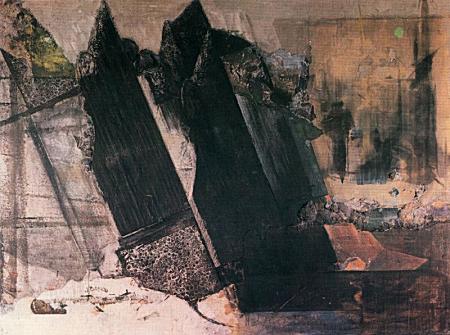
Lucio Muńoz
b. Dec. 27, 1929
_______________________
Dead Trees, or Dead Formats?
David Haeselin reviews Ted Striphas, The Late Age of Print: Everyday Book Culture from Consumerism to Control
electronic book review
(....)
Adopting Raymond Williams' famous model of emergent/dominant/and residual cultural formations, Striphas transcends the "dead" or "indispensable" binary by using books (digital or print) as examples of feedback mechanisms that determine contemporary consumer culture. Rather than regurgitating either the "book is dead" platitude of the popular press found in Sven Birkerts' The Gutenberg Elegies (1995) and Jeff Gomez's Print is Dead (2008), or fetishizing the book's transhistorical importance seen in more traditional book history, the reader is asked to interrogate the underlying narratives that obscure the material relations between cultural production and consumption. Striphas writes a multi-leveled book history in the age of digital reproduction without succumbing to simple romanticization - the tactic of many digital converts - of the scholarly tools related to that technology. He illustrates that reading has not been entirely eclipsed by digital media, but has become something different that must be understood in order to defend our continued allegiance to the book form as a medium for thought and political analysis.
The book, it seems, is a duplicitous object......(more)
_______________________

Denis Dutton
1944-2010
founder and editor of Arts & Letters Daily
a master of the tweet long before Twitter existed.
- nyt tweet
Art And Human Reality A Talk With Denis Dutton
Introduction By Steven Pinker edge
The Art Instinct: Beauty, Pleasure, & Human Evolution
Denis Dutton google books_______________________
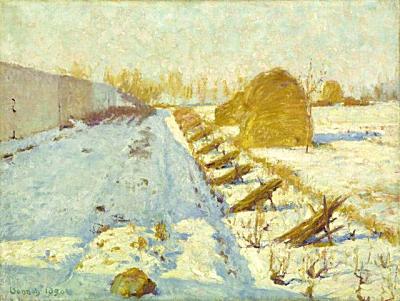
Winter Sun and Shadow
1890
Robert Vonnoh
d. Dec. 28, 1933
_______________________
Three Poems
Norene Cashen
1. Last Code Talker
A sketch was submitted
We held it as if we knew
And we did know
As if forgetting
Were a lost pattern
As if the code had tapped us
On the shoulder
We knew it had found us
Sitting there reading
The last quarter of our lives
A line drawing cut into words
The same surface
Sinking in our hands
...(more)
_______________________

Sands Street
Brooklyn
Andreas Feininger
1946
_______________________
Cinema:
Journal of Philosophy and the Moving Image
No 1 (2010)
_______________________
Media Fields Journal
inaugural issue
_______________________

Harwich Estuary
1913
Philip Wilson Steer
b. Dec. 28, 1860
_______________________
Poems
Louise Rosengreen
(trans. from Danish Thomas E. Kennedy)
The poet's hat
The poet takes his hat off/ for those who have other things on their mind:
a shoe/
a medister sausage.
That's poetic/ but not for those who have other things on their mind:
municipal reforms for example.
The poet puts his hat on/ again and goes/ but not farther away than he turns up/again
with dolls on his hands:
Here's Dolly Parton/
she plays the banjo with long nails/
she sings with big breasts/ the poet likes that.
Here's Heidi/ say hi to Heidi/ she met her lover on the internet/
Her little sister doesn't understand that/ little sister is afraid of the internet/ it is so big.
Here are his hands/
Here are his hands behind his back.
...(more)
Past Simple 9

Port of New York
section for derelict vessels
1940
Andreas Feininger
b. Dec. 27, 1906
_______________________
In Cold Hell, In Thicket
Charles Olson
In cold hell, in thicket, how
abstract (as high mind is, as not lust, as love is) how
strong (as strut or wing, as polytope, as things are
constellated) how
strung, how cold
can a man stay (can men) confronted
thus?
Language even is made bitter, words
are made to taste like paper wars, get tossed up
like lead soldiers used to be
(in a child's attic) lined up
to be knocked down, as I am,
by firings from a spit-hardened fort,
as we are, here, from where we must go
God, that a man, as his acts must, as there is always a thing
he can do, he can raise himself, he raises
on a reed he raises his
Or, if it is me, what
he has to say
(....)
2
That it is simple, what the difference is -
(that a man, men, are now their own wood
and thus their own hell and paradise
that they are, in hell, or in happiness, merely
something to be wrought, to be shaped, to be carved, for use, for
other
does not, in the least, lessen his, this unhappy man's
obscurities, his
confrontations
He shall step, he
will shape, he
is already also
moving off
into the soil, on to his own bones
he will cross
(there is always a field,
for the strong there is always
an alternative)
But a field
is not a choice, is
as dangerous as a prayer, as a death, as any
misleading, lady
He will cross
And is bound to enter (as she is)
a later wilderness.
Yet
what he does here, what he raises up
(he must, the stakes are such
this at least
is a certainty, this
is a law, is not one of the questions, this
is what was talked of as
- what was it called, demand?)
He will do, what he now does, as she will, do
carefully, do
without wavering,
without
as even the branches
even, in this dark place, the twigs
how
even the brow
of what was once to him a beautiful face,
as even the snow-flakes waver in the light's eye
as even forever wavers (gutters
in the wind of loss)
even as he will forever waver
precise as hell is, precise
as any words, or wagon,
can be made
...(more)
A Taste of Olson
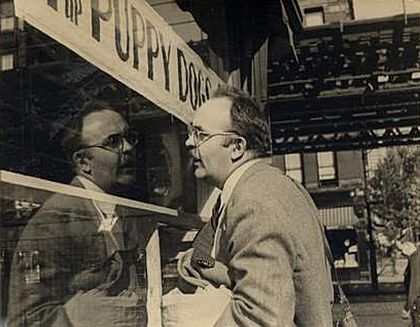
Charles Olson
b. Dec. 27, 1910
Photo by Mark Riboud
1948
The Charles Olson Research Collection
_______________________
Interiors
Rainer Maria Rilke
Translated from German by Damion Searls
Paris Review
XIII.
You cannot hold anything against this calm and tranquil occupation: the story of Zoroaster, that of Plato, that of Jesus Christ and Columbus and Leonardo and Napoleon and many more, did need to get written. In other words, these stories wrote themselves, so to speak. Every one of this cast of characters etched a furrow in the great gray brain of the earth, and we all carry a miniature reproduction of this archetypal brain within us, like a pocket watch or the small round pill of a compass that shows where the sun rises over a worthy citizen’s belly. Later the stories of rare women came into existence; but here a little assistance was necessary, and a logic and a mnemotechnic were invented for the geocentric primary brain that even the historians of today are still proud of. In our most recent century, which has almost died away now, people worked more and more on the paysage intime—they wanted to tell the story of the nameless individuals. Someone finally seemed to notice that battles don’t only take place at Thermopylae or Hastings or Austerlitz, sometimes the battlefield is called Fear or Desire or Ingratitude; that not every discovery is of America; that not every invention has to arrive at gunpowder or the steam engine or the airship in order to be meaningful and, in a certain sense, fruitful. And so it has become the norm to present not true, authenticated heroes, but plausible, authentic-seeming heroes. To this end they have spent the last few decades ripping apart the heroes of the past and the usable contemporaries and putting together new, ever new possibilities from the unrecognizable pieces. These possibilities are supposed to come across as interesting or singular human beings, at least when you look at them in the right light, from a certain angle. And people keep making these attempts, incessantly, keep manufacturing modern legitimacies that make the old measures seem moderate; they’re very happy when one of these specimens, after they attach its head not to its torso but to its right toe, clings to life for a while. That’s how people become clever. In other words, they lay in a collection of more or less serious experiences and then have to rent an extra room to hold all the fruits of their vigorous, diligent research. When you look at it this way, of course, the rare types and unexpected nuances count most heavily. And it may indeed be that mature human beings, standing in sharp contrast to their surroundings, do experience strange things, and in the strangest way too. It is said that their “fate” is of the greatest interest, and two things are meant by this word: that which strikes them from without, and their actions and reactions when faced with these blows and impressions. ...(more)
_______________________
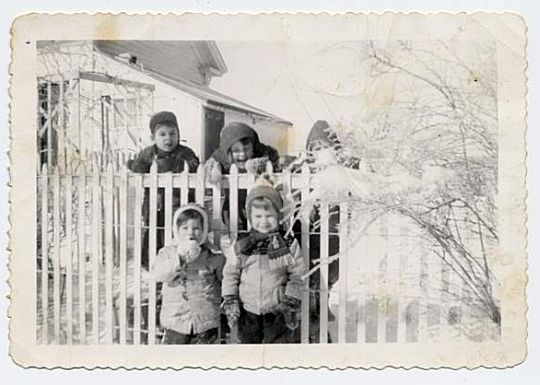
Photographs Owned by Charles Olson
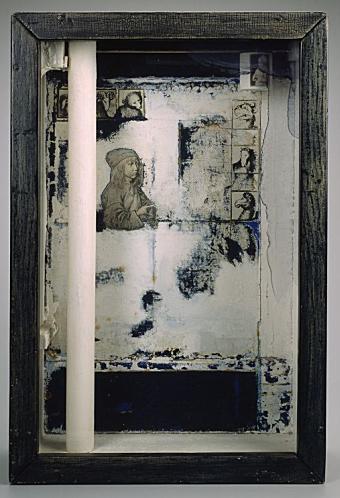
Hotel du Nord
c. 1950
Joseph Cornell
_______________________
Fall On Your Knees
Brad Zellar
Your Man For Fun In Rapidan
(....)I fall down. I've fallen down. That's something that I won't deny, but I'm also not prepared to admit it as any sort of proof that the last five years happened. Maybe I fall down in some other dimension. I don't know, to be honest with you, but I do know that I don't fall down in what some of you people will insist on calling the real world or "the here and now."...(more)
_______________________
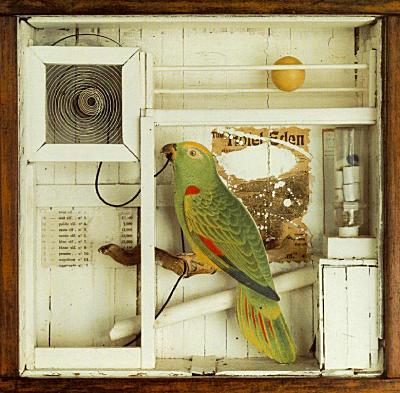
The Hotel Eden
c. 1945
Joseph Cornell
b. Dec. 24, 1903
_______________________
Samuel Beckett: from Worstward Ho
courtesy of Tom Clark
All of old. Nothing else ever. Ever tried. Ever failed. No matter. Try again. Fail again. Fail better.
First the body. No. First the place. No. First both. Now either. Now the other. Sick of the either try the other. Sick of it back sick of the either. So on. Somehow on. Till sick of both. Throw up and go. Where neither. Till sick of there. Throw up and back. The body again. Where none. The place again. Where none. Try again. Fail again. Better again. Or better worse. Fail worse again. Still worse again. Till sick for good. Throw up for good. Go for good. Where neither for good. Good and all.
It stands. What? Yes. Say it stands. Had to up in the end and stand. Say bones. No bones but say bones. Say ground. No ground but say ground. So as to say pain. No mind and pain? Say yes that the bones may pain till no choice but stand. Somehow up and stand. Or better worse remains. Say remains of mind where none to permit of pain. Pain of bones till no choice but up and stand. Somehow up. Somehow stand. Remains of mind where none for the sake of pain. Here of bones. Other examples if needs must. Of pain. Relief from. Change of....(more)
_______________________
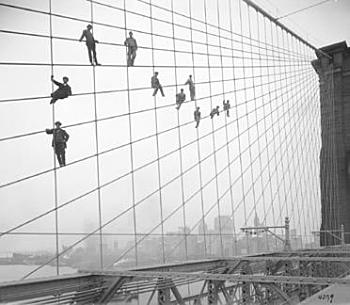
Brooklyn Bridge Painters
Eugene De Salignac
1914
Grids
Weimar
_______________________
The New Cooperativism
Affinities: A Journal of Radical Theory, Culture, and Action
Vol 4, No 1 (2010)
Logos & Episteme:
A New Environment For Philosophical Debate
Volume I, Issue 1, 2010
Philosophical News
innaugural issue
Synthesis philosophica, Vol.25 No.1
_______________________
The Buried Life
Matthew Arnold
(24 December 1822 - 15 April 1888)
(....)
But often, in the world's most crowded streets,
But often, in the din of strife,
There rises an unspeakable desire
After the knowledge of our buried life;
A thirst to spend our fire and restless force
In tracking out our true, original course;
A longing to inquire
Into the mystery of this heart which beats
So wild, so deep in us--to know
Whence our lives come and where they go.
And many a man in his own breast then delves,
But deep enough, alas! none ever mines.
And we have been on many thousand lines,
And we have shown, on each, spirit and power;
But hardly have we, for one little hour,
Been on our own line, have we been ourselves--
Hardly had skill to utter one of all
The nameless feelings that course through our breast,
But they course on for ever unexpress'd.
And long we try in vain to speak and act
Our hidden self, and what we say and do
Is eloquent, is well--but 'tis not true!
And then we will no more be rack'd
With inward striving, and demand
Of all the thousand nothings of the hour
Their stupefying power;
Ah yes, and they benumb us at our call!
Yet still, from time to time, vague and forlorn,
From the soul's subterranean depth upborne
As from an infinitely distant land,
Come airs, and floating echoes, and convey
A melancholy into all our day.
...(more)
_______________________
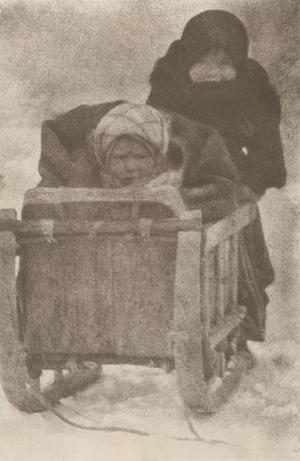
Visit to Granny
1907 – 1908
Sergei Lobovikov
Quiet Resistance
Russian Pictorial Photography
1900–1930s
Moscow House of Photography
_______________________
Perhaps the World Ends Here
The world begins at a kitchen table. No matter what, we must eat
to live.
The gifts of earth are brought and prepared, set on the table. So it
has been since creation, and it will go on.
We chase chickens or dogs away from it. Babies teeth at the corners.
They scrape their knees under it.
It is here that children are given instructions on what it means to be
human. We make men at it, we make women.
At this table we gossip, recall enemies and the ghosts of lovers.
Our dreams drink coffee with us as they put their arms around our
children. They laugh with us at our poor falling-down selves and as
we put ourselves back together once again at the table.
This table has been a house in the rain, an umbrella in the sun.
Wars have begun and ended at this table. It is a place to hide in the
shadow of terror. A place to celebrate the terrible victory.
We have given birth on this table, and have prepared our parents for
burial here.
At this table we sing with joy, with sorrow. We pray of suffering
and remorse. We give thanks.
Perhaps the world will end here at the kitchen table, while we are laughing
and crying, eating of the last sweet bite.
-- Joy Harjo, from The Woman Who Fell From The Sky , 1994
_______________________
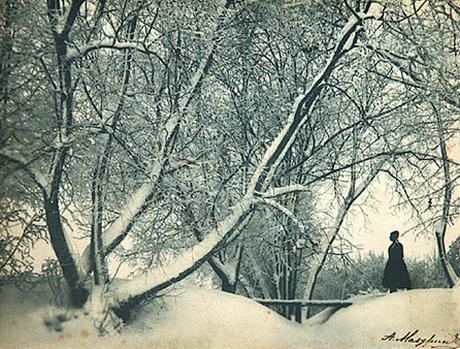
Aleksey Mazurin
1900s
Russian Pictorialism
From M. Golosovsky Collection
_______________________
Ice Floe
for Jac Po II
There was ice. There was permanent snow.
We were speaking different languages.
We were speaking different languages.
There was permanent snow. There was ice.
Poems
Justyna Śliwka
(Trans. from the Polish Justyna Śliwka)
Past Simple 9

Following the Reindeer
photographs and text by
Evgenia Arbugaeva
_______________________
The Anonymity of Snow
Dylan Trigg
(....)
Outside, human life has adapted well to this white terrain. With cautious movements and contrived happiness, the falling snow dissolves boundaries between different lifeworlds. Human life regresses: the haggard smiles of adult faces exceed their allotted dosage, now resembling a musty shadow of a primitive childhood state. Over the grey and white blocks of sedimented materiality, cracks form and the soft skin surrounding the eyes of adult faces begin to sag against the white flesh of the world.
But all this is quite remote from Bachelard. True, we know from him that snow is constitutive of an immemorial memory, conferring a depth of presence upon the world. Snow is the centre, and the house is the axis through which the universe is channelled. Yet owing to Bachelard’s agoraphobic relation to the outside, for him, snow is only conceived as a thing pressing down and reinforcing the fortitude of the house. Never does he encounter the house as yielding to its own otherness: that is, as viewed from the outside. Indeed, at times he will go so far as to say that winter is a “simplified cosmos,” marking a “non-house,” which ultimately entails a “cosmic negation”. What did Bachelard omit in this refusal to move beyond the inside?...(more)
_______________________
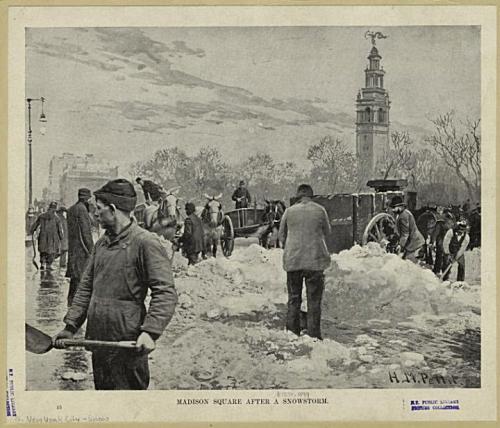
Madison Square, 1899
Snow!
New York Public Library
_______________________
th wintr peopul
ar responding 2 th green hous effekt evree
few yeers they find it 2 warm n go furthr
north 4 comfort toronto is now 2 cozee 4
them th sault n thundr bay r far 2 summree
they feel th warmth 2 b frivolous it makes
them un eezee 7 yeers ago aftr having found
nu liskeard 2 mediterranean th wintr peopul
discovr church hill falls 2 b mor balmee thn
they wud want n ar hedding tord th artik
circul evn ther they bcame restless th artik
was warming up if it heets up evree wher
wher will th wintr peopul go full uv needs 4
snow n icikul pellets flying in th freezing rain
n snow hills n mountains mooving around th
elk n polar bears th sun glayzlng on th ice
fields th hallucinating cold n steem from
theyr wishes 4 th souls fire not distraktid by
anee gud wethr
Bill Bissett
_______________________
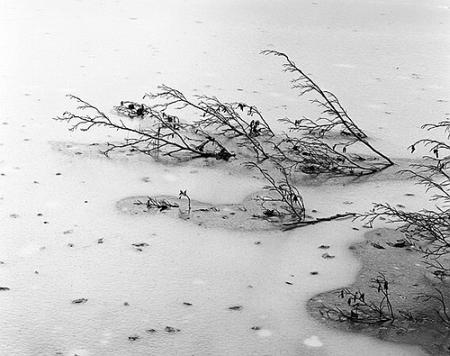
Luca Gilli
more
via arsvitaest
_______________________
Activism in a Digital Culture
James Quinney , Joss Hands
_______________________
Interface: a journal for and about social movements
Volume 2 Issue2: voices of dissent
_______________________
John Pilger - The War You Don't See
in 7 parts
youtube
_______________________
A Primer on Supply-Side vs Demand-Side Economics
David Brin
Ethical Technology
All through the 1980s, 1990s and 2000s, the mantra was:
- if the federal budget is in deficit, cut taxes on the rich, in order to repair that deficit.
- if the federal budget is in surplus, cut taxes on the rich, because it’s their money, not the government’s, and there will henceforth be no rainy days.
- in times of peace, cut taxes on the rich, because government has lower priority in peacetime.
- in times of war, cut taxes on the rich, because… well, this one never made sense even by conservative logic. Indeed, this was the first time in US history that the clade of uber-wealth demanded ever-increasing state largesse even while the nation was under deadly threat.
In any event, we must admit that the core demand of SSE believers has been utterly consistent. Reducing taxes on the uber-wealthy is good for America, across all circumstances, under all conditions and without limit. ...(more)
_______________________
Skepsi
Volume III, Issue 2, Winter 2010
Pharmakon: Literature and Violence
_______________________

photo - mw
_______________________
In the Seventh District of the City
George Szirtes
almost island
(....)
Je est un autre, said the young Rimbaud. Well, yes. What other option is there for the child than to be an other, or another, a definable completed entity, a sequence of hindsights that lands him right where this sentence lands you?
At the beginning of language there were two distinct urges: one to register presence, the other to register desire. The first—a cry—became poetry; the second—a question—became the story. What happens next? Asks the story. If I do this, desiring that, what will you do? And after that? And then?
And then? The oldest words. The root of syntax. Syntax leads us to conclusions: that is its nature, its whole drive. It's the only thing that appears to make sense, the rest is explosions and exclamations. But there remains naming: not ‘then?’ but ‘what?’ That is the cry that a poem is, or at least the heart of the poem, in which language confronts the phenomenon of the world. See! It's here! It is present! I feel it! It isn't anything I have ever named before. If I rock to and fro and summon up my very first verbal sensations I may be able to start constructing a meaning. The words themselves are as strange and alien as the thing out there. But, having named—or possibly in the very act of naming—I have to rely on the assuring nonsense of syntax to tie this fragment to that fragment, so it makes a whole that goes nowhere in particular (few people hold their breaths to see what the last line of a poem might be), but is an echo in language of what the thing is....(more)
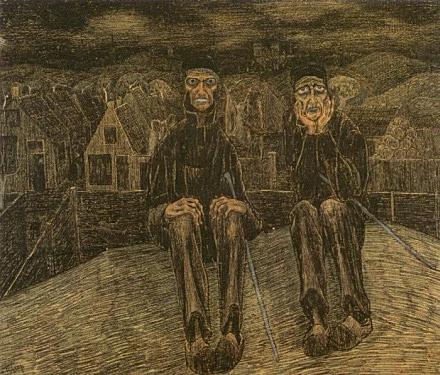
Les calvinistes de Catwijck
aka
Hell and Doubt
Old Superstitious Dreamers
1891
Jan Toorop
b. Dec. 20, 1858
_______________________
Four poems from Das Auge des Entdeckers (The Discoverer’s Eye)
Nicolas Born
Translated by Eric Torgersen
exquisite corpse
On the Inside of Poems
You can't make a living
competing with reality
you can't live on reality either
you can survive an operation
and get everything back
and go on through Life
through quickly fading pictures
that was you
you and the One in the Oven
Persons panting under their tombstones--
With unspeakable exertion
by you and all your ancestors
you shield yourself
Land and water remain
the sky remains
and you remain
you have nothing to get ready for
little suns light your democracy And
you choose life and death
you have many Beautiful Voices
you are many
your skin is your skin And finally
nothing but skin
you're the entrepreneur of Life
impresario of white apparitions
you're the Spaceman out in the universe
the author of the course of history
you can print time like books
you dice and sieve and love And the ruins
of dictating machines are blowing in the wind
unreason is in full bloom
you're the bloom and the unreason
you're day and night in the day and at night
you're the killer
circling through your own veins
you're father and son
you're the slaughtered Indian
and the registered Indian
you're all colors and races
you're the widows and orphans
you're the prisoners' uprising
you're a howling that never ends
knife-throws shots
you're the fantastic athlete of the Dream Miles
the iconoclast in the head of democracy
you're the master chain-breaker
you're the secretly shining phrase
the pennant
the avant garde of the Free Kitchens
you're Man And
Beast when it senses death
you're alone and you're everyone
you're your death and you're the Great Wish
you're the map you're spreading out And
you're your death
...(more)
_______________________
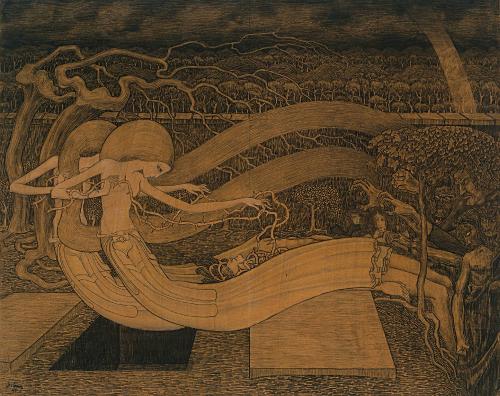
'O Grave where is thy Victory'
Jan Toorop
_______________________
The green-wood essay: a little autobiographical dictionary
from rob mclennan's blog by rob mclennan
(....)
The world outside the house a language that requires itself to be understood, if one is to depend on such for livelihood, direction. Inside the farmhouse, another sort of language existed, constructed out of singular, similar silences. Codes not taught or explained, and often defied comprehension. Learning another language by rote, by trial-and-error. We would not speak, thus.
6.
Poet Phil Hall speaks of tokens, essential remnants, markers. The heart of history engages and emerges from our objects, often. A washboard from cobwebbed basement, my grandfather’s ancient film camera, his shaving travel case I carry. Who we are and where we’re from a thing constantly renegotiated, something carried within, no matter where we might end up. Foundations rarely change, no matter subsequent constructions.
My apartment is littered. Tokens, large and small. Hall’s fill up the barn behind his Perth-area cottage. What do these magpie tendencies, these impulses, mean? Where do they take us? Or do they stabilize. Not hold back, nor hold in place. Foundations....(more)
_______________________
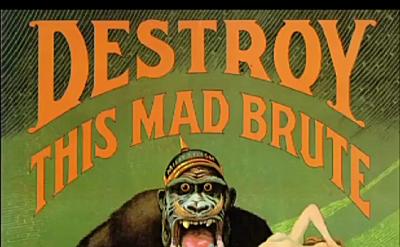
The War You Don't See
John Pilger
1:36
youtube
The film asks: ‘What is the role of the media in rapacious wars like Iraq and Afghanistan? Why do so many journalists beat the drums of war and not challenge the spin and lies of governments? And how are the crimes of war reported and justified when they are our crimes?’ It’s a film about truth and justice.
In the opening sequence, I refer to David Lloyd George, Britain’s prime minister during much of the First World War, who had a private chat with the editor of The Guardian, CP Scott, at the height of the carnage. ‘If people really knew the truth,’ said Lloyd George, ‘the war would be stopped tomorrow. But of course they don’t know and can’t know.’ My film is about people’s right to know.
(....)
The answer is: tell the obvious truth; and the truth of war is the grotesque. It is trees hanging with the body parts of children. It is people going insane before your eyes. It is terrified soldiers with their trousers full of shit. It is human damage that runs through countless families: civilians and soldiers. That’s war. The coverage of war should be this eyewitness but it should also try to tell us the why. That means journalists not colluding but investigating. One of the most revealing documents released by Wikileaks was a 2,000-page Ministry of Defence document that equated investigative journalists with terrorists. That reflects the lethal stupidity that runs like a current through the war-making industry. It says they are afraid of the truth.
-
John Pilger
_______________________
Bloody Trophies
Linh Dinh
Dissident Voice
We have an unprecedented capacity to absorb scandals. Wikileaks or no, Americans wake up each day to a new set of outrages, yet nothing changes. With hundreds of channel at our fingertip and a billion songs sloshing in our skulls, no crime against country, man or earth can linger long enough in any brain cell to matter. All synapses are currently busy with bullshit, yet again, thank you. ...(more)
_______________________
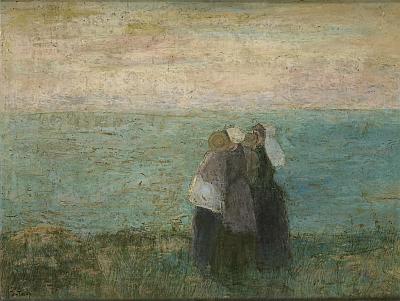
Women at the sea
Jan Toorop
_______________________
The Visitor Edward Hopper Received Two Years Before His Death
Mario Sabino
Translated from PortuguesePortuguese by Clifford E. Landers
(....)
At twilight, back from the stroll, I always sit at the same table in the same bar in the town square to have a glass of wine and observe the contrast between the medieval architecture and the fountain by Arturo Martini—the artist who, when he gave up sculpting, decreed in writing the end of sculpture. On less pessimistic days I find his attitude an act of narcissism. On more pessimistic days I recognize his realism. When seven o'clock comes, I withdraw. I watch the news on television, have some soup, and read in bed passages from some classical author. The most-read in my nightstand has been Dante. Of the Commedia I prefer, as I believe do the majority of readers, the Inferno and the Purgatorio to the Paradiso. But the Paradiso is better for fighting insomnia.
Let me explain. The themes and verses of the Paradiso, with their sanctified Beatrice and all those considerations about divine love, are less emotional than the cantos that precede them—and therefore less inspiring from an iconographic point of view. It is enough to compare the illustrations by the Frenchman Gustave Doré: those for the Inferno and the Purgatorio are far superior. But it is not only because it is somewhat tedious that the Paradiso is effective against my insomnia. It is because its philosophical idealism has the effect of calming my soul:
Qual č'l geomčtra che tutto s'affige per misturar lo cerchio, e non ritrova, pensando, quell principio ond'elli indige…
How can the same religion produce a Dante and the spectacle of vulgarity that we have witnessed for two thousand years? I have never had any patience for manifestations by the rabble. Their devil with caricatural features, horns, tail, goatee, red skin, and eyes: I used to laugh at such foolishness, as do men of intelligence. And I still laugh, although . . . When I was still young, Catholicism became for me merely a cultural reference, replaced by that sheepish atheism called agnosticism—but the truth is that, since the occurrence that I shall relate below, my difficulty in sleeping has come to require insomnia exorcisms. Reading the Paradiso is just that, an intellectual exorcism.
I’ll use the exact term, why not? My difficulty sleeping is called fear. Fear of seeing him in the shadows of my room. Or rather, seeing him again—if it was really he that I saw. Even sleeping, I can’t rid myself of the fear. In a recurring dream, the creature enters my mouth forced open, after folding its enormous black bird-wings like those of the angels painted by Ghirlandaio. Horrifying....(more)
Words Without Borders
December 2010: Horrors_______________________
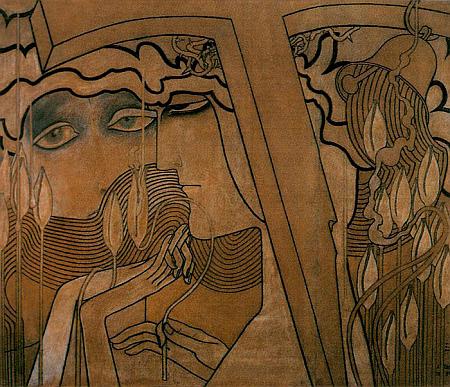
Desire and Gratification
Jan Toorop
1893
_______________________
Lacan’s Ethics and Foucault’s “Care Of The Self”:
Two Diagrams of the Production of Subjectivity
(And of the Subject’s Relation To Truth) [pdf]
Simon O’Sullivan
Introductory Remarks: Desire Contra Ethics?
With the “discovery” of the unconscious, and the introduction of desire into questions of an individual’s motivation, Freud in one fell swoop renders all previous accounts of ethics, and thus of the subject, partial. Bluntly put, psychoanalysis demonstrated, explicitly for the first time, that there is something else that determines our behaviour up and beyond (or indeed, below) the “good,” whether it be our own, someone else’s, the good of society/humanity, or “the good” in a more general and abstract sense. It is this revolution in ethical thought that is the subject of Jacques Lacan’s seminar on The Ethics of Psychoanalysis, a revolution that is also a redefinition inasmuch as the latter is then not to do with the good at all, at least not in the above sense, and also not to do with what Lacan calls “the service of goods” (that includes the accumulation of wealth, commodities and so forth), but with that very desire—unpredictable, non-productive and unconscious—that will necessarily upset any such moral position. It is also this that marks psychoanalysis with tragedy insofar as such desire in operating contra this good (and especially the good of the individual) is also a being towards death.
The goal of Lacanian analysis—if it can be said to have one—is then less a “cure” or the production of a healthy productive individual (that is, the building up of the ego and the making of a “good” person) than the assumption of what might be called the subject of the unconscious that can only take place via the dismantlement of the various imaginary identifications that led to the former, including the various ethical ones (precisely about being a “good” person and so forth). This is not then an ethics of the individual at all, at least not of the conscious subject, rather, it is an ethics concerned with that impersonal desire that the former masks and which, for Lacan, constitutes the very truth of our being. It is, we might say, an ethics turned upside down.
parrhesia :: a journal of critical philosophyIssue 10, 2010
_______________________
Seven circles of European memory
Claus Leggewie
Translation by Simon Garnett
eurozine
The most significant challenge for a European memory is to reconcile "competing" memories of the Holocaust and the Gulag. Yet other historical experiences must also be integrated: memories of wartime and expulsion, of colonialism and immigration, and not least of the "success" of the European Union. _______________________
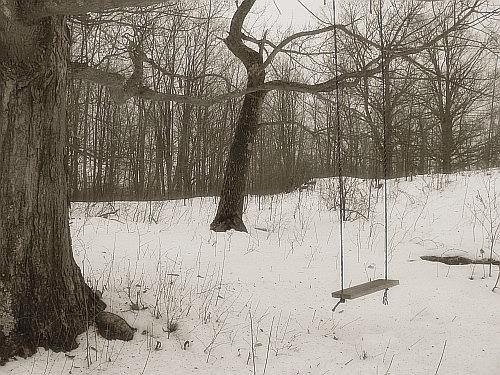
photo - mw
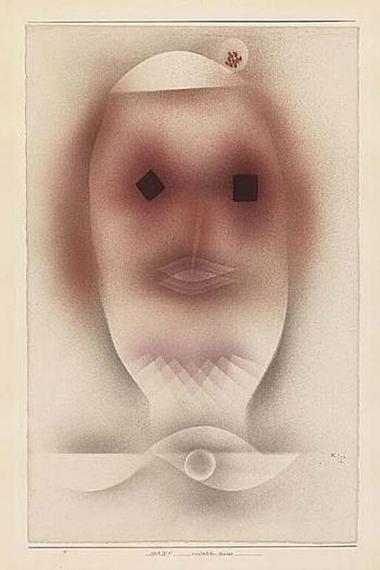
Wintery Mask
1925
Paul Klee
b. Dec. 18, 1879
_______________________
The Weather: A Report on Sincerity
Lisa Robertson
(....)
Should it come as a surprise that Britain's most profitable television export is not costume drama but weatherporn? Weatherporn. An atmospheric condition dallies with some lives and we drink its lusty spectacle from the screen. Description pries up, frees itself, briefly phatic, expresses a gestural plenitude, framed by but untied to the sociality of objects. This loosening is diction as rhythm. It crosses borders. The weather becomes a flickering social prosody. As it abstracts into rhythm it becomes commodified, universal. Really. It was a fireball, right through the front door, and out the back.
It's real. It's mythic. It's wild. It's a vernacular. It's didactic. It's boredom. It's ceaseless. It's a delusional space.
Stacy Doris says "In terms of geographies and nationalities, the best bet for poetry is delusional space. . . Any poetry that doesn't somehow begin in a realm of wild fantasy is not worth the writing." This weather's the wild fantasy. It seizes us. Together our faces tilt upwards. A wild dream of parity must have its own weather and that weather will always have as its structure an incommensurability. If each forecast is a fiction I prefer to add to that fiction alternate delusions-- a delusionary politics that describes current conditions as it poses futurities. I mean it.
Here is want I want to say. Sincerity has a rhetorical history. The history of the description of weather parallels the history of sincerity as a rhetorical value. The delimitation or purification of diction is common to both. Part of this delimitation is idiomatic; part derives from a tradition of quotation, of genre. When Virgil described the weather prognosticatons in The Georgics, he quoted Lucretius and Aratus' Diosemia, which in turn referred to Hesiod's Works and Days. James Thomson, in The Seasons, quoted Virgil, both structurally and substantially. John Clare learned an ideology of directly observed description from Thomson, as did Wordworth. Etcetera. But parallel to the literary and idiomatic geneology of the atmosphere, was the standardization of scientific rhetoric, the language of natural philosophy and early meteorology....(more)
via riley dog
12 or 20 questions: with Lisa Robertson
rob mclennan
A Conversation with Lisa Robertson Lemon Hound
_______________________

photo - mw
_______________________
The New Amazing Grace [pdf]
Conceived, Gathered and Sequenced by Edward Sanders
-a collection of over 75 new verses to this classic hymn by outstanding poets, writers, and composers.
....
There's nothing but the Blackness there
Graceful as the grace to see
I send my eye beams sailing out
They bring back Grace to me
—Michael McClure
....
Amazing Grace, Lascaux be found
in earth on which Dachau;
a womb beyond repair,
imagination spans despair.
—Clayton Eshleman
_______________________
Let’s invent a word so haunted, so transformational–so transitional–that the moment you type it your soul is sucked through it & into communication with & exile from everything. “Everything” being the truth about the world, in the sense that it is the world. “The truth about the world” being that it’s everything in the world–& though you were always in the world, now you are in there with it, which is a different matter altogether. It is not a truth you wanted to know, this quality of the world being able to lie alongside itself & yet remain a single thing. But you spoke the word. You turned the key.
- m john harrison
_______________________

Angelus Novus
Paul Klee
1920.....................................................
This is how one pictures the angel of history. His face is turned toward the past. Where we perceive a chain of events, he sees one single catastrophe which keeps piling wreckage upon wreckage and hurls it in front of his feet. The angel would like to stay, awaken the dead, and make whole what has been smashed. But a storm is blowing from Paradise; it has got caught in his wings with such violence that the angel can no longer close them. This storm irresistibly propels him into the future to which his back is turned, while the pile of debris before him grows skyward. This storm is what we call progress.
-
Walter Benjamin, "On the Concept of History"
_______________________
Copy, Archive, Signature: A Conversation on Photography
Jacques Derrida
Translated by Jeff Fort
ifile pdf
Hubertus von Amelunxen: Skiagraphy refers to
shadow writing, and to the absence of the referent.
You speak of this in your work Memoirs of the Blind.
Skiagraphy seems to prefigure the imprint of an ab-
sent present. The inventor of the photographic negative, William Henry Fox Talbot, called his invention
skiagraphy or “words of light.” In 1837 he made a photographic image with an inscription of the alphabet,
the name of the place, and the date, as if he wanted to
show that the entire alphabet could be taken into the
image and that photography was going to be the first
optical medium to enter the domain of writing and
to bring writing into the very essence of the image. In
Memoirs of the Blind you speak of skiagraphy, the writing of shadow, as a simultaneous memory, a memory
of the present, a division of the instant. But whence,
then, this memory of the instant, whence this archive
of the present?
Jacques Derrida: It’s a question of point of view, and you are touching on the most acute point [la pointe] of the difficulty. Is it possible to think otherwise than from the point of view of the point? But is it possible also to think from a point of view? How to imagine an archive that is somehow immediate, a present that consists of its own memory or its own reproduction? In that case, which is something more and other than a case, experience itself, the experience of what one calls the present would be constituted as self-preserving, certainly, but in such a way that something may be lost, and something kept and preserved, from the same event, from the point of the event, from its miniscule extremity, its pointedness, its pointe. It is indeed a matter of the pointe, the most acute question, the sharpest and most pointed question about this pointe. For in general one conceives of the instant precisely as a pointe, as stigmź, as Punkt, and the punctuality of the point would be, first of all, indivisible. But in the situation that we are evoking, we have to do, paradoxically, with an experience of the singular, of the non-iterable, of the unique that would, however, be divisible enough for an archive to separate off from it somehow: an archive would remain; it would survive, whereas that of which it is the archive has disappeared— a normal phenomenon—but in this case the archive would not be simply the copy, the reproduction or the imprint of another present. If the archive is constituted by the present itself, it is therefore necessary that the present, in its structure, be divisible even while remaining unique, irreplaceable and self-identical. The structure of the present must be divided so that, even as the present is lost, the archive remains and refers to it as to a non-reproducible referent, an irreplaceable place.
I don’t know if this introduces us to the specific question of photography, or if this general law would be valid for every archive, or in any case for the phe- nomena of the signature in the broad sense. It’s true that photography performs this miracle as a techno- logy of the miracle, that is, by giving something to be seen. And of course it has often been remarked (Barthes insisted on this) that what seems to give the photogram its specificity is this apparently irreducible viewing of the referent, this pointing at and seeing the referent, insofar as it has taken place only once. In the end, photography seems to say (and to let this be dictated to itself ): this took place, and it took place only once. It is the repetition of what has taken place only once. Reference, if not the referent, here seems to be ineffaceable. One would no longer be able to bracket it. That is what Barthes says, with a great deal of good sense. I don’t know what you think of this. I think that, in the little text I devoted to Barthes,I hint at a certain reserve regarding this question. I believe I understand what Barthes says, and what he proposes seems necessary to me. I only wonder what, in that case, is proper to photography. Every original imprint is divided as an archive and preserves its reference, as with the original manuscript of a letter, or a signature, for example. What happens, in those cases, when photography reproduces this original without giving to be seen a singular moment of the world, when for example a photocopy is made of this original signature? A photocopy is, after all, a photograph, isn’t it? the book includes
Between Translation and Invention
The Photograph in Deconstruction
Gerhard Richter
_______________________

photo - mw
_______________________
Purity, Restraint, Stillness
James Longenbach
(....)Not everyone is by nature so stoic, nor does anyone need to be – unless such stoicism distinguishes him truly. My point today is not that anyone ought necessarily to strive to write like Oppen or Marvell or any other writer. Nor is it my intention to hold up the values of purity, restraint, and stillness as inevitably superior to any other values – except inasmuch as these values seem more compatible with the acts of submission on which great art depends. "Idolatry of the forms which had inspired it," says Proust, "a tendency to take the line of least resistance, must gradually undermine an Elstir's progress." Stillness and restraint will move you if such values distinguish the poems you must write – against your own will. Oppen or Marvell will matter if you learn to hear yourself by listening to them. The greatest poems we will write already exist, and the work of a lifetime is to become meek enough to recognize them as our own....(more)
_______________________

Twittering Machine
Paul Klee
1922
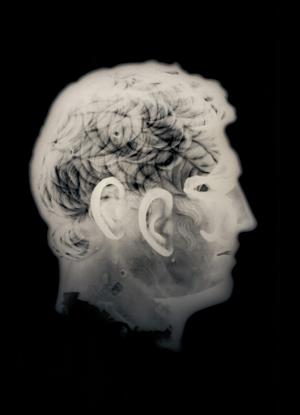
History’s Shadow
David Maisel
Through the x-ray, the artworks of origin become de-familiarized and de-contextualized, yet acutely alive and renewed. Culled from archives and re-photographed by the artist, the spectral qualities of these renderings are like transmissions from the distant past, conveying messages across time.
_______________________
I’d Like to See It
Norman Fischer
A compendium of words was stored here
Just underneath the chimney
I’d like to see it that way
Fortune won’t stand still for that
And pressure of the air flattens paper
I’d like to see it that way
One comes into the room groomed, a pleasure
There’s a patch of glitter in the glamor
I’d like to see it that way
Each moment opens up sudden as an umbrella
On a day storms gather like wool
A way I’d really like to see it
So you can’t assume a face again
Before the non-face puts in its appearance
Nor can you push at the door expecting satisfaction on the other side
I’d like to see it that way
...(more)
PoemTalk 38: Norman Fischer's "I'd Like to See It"Norman Fischer at PennSound
_______________________
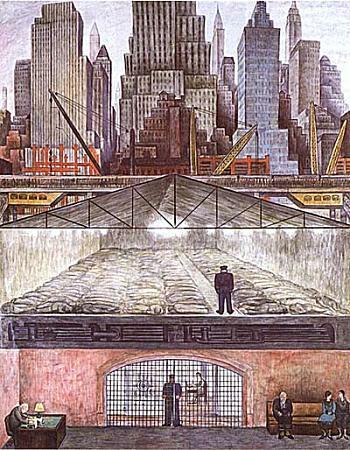
Frozen Assets
Diego Rivera
(1931)
A Depression Art Gallery
The Great Depression
Compiled and prepared by Cary Nelson
_______________________
To Have Is to Owe
Mesopotamian usury, Vedic accounting, American Jubilee: excavating the history of fiscal debt.
David Graeber
Illustrations by Joanna Neborsky
triple canopy
For thousands of years, the struggle between rich and poor has largely taken the form of conflicts between creditors and debtors—of arguments about the rights and wrongs of interest payments, debt peonage, amnesty, repossession, restitution, the sequestering of sheep, the seizing of vineyards, and the selling of debtors’ children into slavery. By the same token, for the past five thousand years, with remarkable regularity, popular insurrections have begun the same way: with the ritual destruction of debt records—tablets, papyri, ledgers; whatever form they might have taken in any particular time and place. In the throes of the recent economic crisis, with the very defining institutions of capitalism crumbling, surveys showed that an overwhelming majority of Americans felt that the country’s banks should not be rescued—whatever the economic consequences—but that ordinary citizens stuck with bad mortgages should be bailed out. This is quite extraordinary, as Americans have, since colonial days, been the population least sympathetic to debtors. (Back then, the ears of an insolvent debtor would often be nailed to a post.) The notion of morality as a matter of paying one’s debts runs deeper in the United States than in almost any other country, which is odd, since America was settled largely by absconding debtors. Despite the fact that the Constitution specifically charged the new government with creating a bankruptcy law in 1787, all attempts to do so were rejected on “moral grounds” until 1898, by which time almost all other Western states had adopted one. The change was epochal....(more)
from David Graeber’s forthcoming book Debt: The First 5,000 Years, to be published by Melville House in January 2011
_______________________
... plutocracy. We mean not just rule by the rich, but rule by and for the rich. We mean, in other words, a state of affairs in which the rich influence government in such a way as to protect and expand their own wealth and influence, often at the expense of others. As the introductory essay to this issue shows, this influence may be exercised in four basic ways: lobbying to shift regulatory costs and other burdens away from corporations and onto the public at large; lobbying to affect the tax code so that the wealthy pay less; lobbying to allow the fullest possible use of corporate money in political campaigns; and, above all, lobbying to enable lobbying to go on with the fewest restrictions. Of these, the second has perhaps the deepest historical legacy.
Scandalous as it may sound to the ears of Republicans schooled in Reaganomics, one critical measure of the health of a modern democracy is its ability to legitimately extract taxes from its own elites. The most dysfunctional societies in the developing world are those whose elites succeed either in legally exempting themselves from taxation, or in taking advantage of lax enforcement to evade them, thereby shifting the burden of public expenditure onto the rest of society.
- Francis Fukuyama
American Interest Jan-Feb 2011
_______________________
2008-2009 should be known, in the future, as a sort of unveiling moment. It is here that the rhetoric about capitalism and free markets were calmly thrown into the garbage can, as the real goal of the state – maintaining the plutocracy – proceeded in defiance of all rules, and against all the surface ‘ideologies’ of the supposed opposite political sides.
- Roger Gathman
_______________________

Swinging
Kandinsky
1925
_______________________
Digital Inflections: Post-Literacy and the Age of Imagination
Michael Ridley
Chief Librarian and Chief Information Office of the University of Guelph
in conversation with Christopher Parsons
ctheory
I like to say that one of the things about librarians is that they're subversive in the nicest possible ways. They've been doing the Wikileak thing for centuries, but just didn't get the credit for it. This is what we try to do all the time; we try to reduce the barriers and open up that information. It's now possible to do this in different ways. The difference, I guess, is that the library is becoming a bit invisible in all of this, which may be partially a function of information networks.
(....)
I'm not here to defend Wikileaks, but just want to say that as a librarian, as someone who works with information, I'm in favor of Wikileaks as a generally good thing. As an organization, as a way that organization is enabled in a networking environment: welcome to the rest of your life. I think we're going to see more and more groups like Wikileaks, not just media but organizations. The idea of a command and control organization that filters information up and down, say good-bye to that, wave farewell because it's gone.
At the end of the day we're learning to become open organizations, and maybe open countries and worlds. This isn't a trivial thing, we'll stumble alone the way, but this seems like an important concept to be put into practice.
(....)
The biggest threat to the library is indifference, of an attitude that is the library is no longer seen as valuable, that we no longer think that learning and growing and expanding and dealing with difference is critical. That there is another way of living your life, and it's not the reflective or examined live. Really, libraries are children of the Enlightenment; we have that ethic behind us that knowing and developing is very important and that our past and ideas are important. If you move into an anti-intellectual age, one that no longer valued ideas and concepts and human freedom, then libraries would disappear because they wouldn't matter so much any more....(more)
_______________________
The WikiLeaks cables present quite a different picture. What emerges is one reality (the real one) colliding with another (the official one). We see smart, good faith diplomats and foreign service personnel trying to make the truth on the ground match up to the one the administration has proclaimed to the public. The cables show the widening disconnect. It's like a foreign policy Ponzi scheme -- this one fueled not by the public's money, but the public's acquiescence.(....)
... in the WikiLeaks case, much of media has again found itself on the wrong side of secrecy -- and so much of the reporting about WikiLeaks has served to obscure, to conflate, to mislead.(....)
... the government's legitimate need for secrecy is very different from the government's desire to get away with hiding the truth. Conflating the two is dangerously unhealthy for a democracy. And this is why it's especially important to look at what WikiLeaks is actually doing, as distinct from what its critics claim it's doing.
- Arianna Huffington
_______________________

Christian & Hopeful
escape from doubting castle
Dalziel Brothers -- Engraver
From Bunyan's pilgrim's progress. In words of one syllable
(New York A. L. Burt 1895) Day, Samuel Phillips., Author.
Children's book illustrations
NYPL Digital Gallery
_______________________
After Alberto Caeiro
Norman Fischer
I’m a shepherd grazing my flock
But it’s a flock of goats not sheep
(....)
When tethered my goats become wound up in the tether
If I allow them their freedom
And follow them to where they are going
They get lost in the thickets
The secret obscure and difficult places
They somehow always manage to find
Though I know they are not looking for these places
These places find them
As a consequence of their own foolish goaty willfulness
That seems to be as indelibly a part of their nature
As talking of them seems to be a part of mine –
If, as I say, I follow their entanglements
I become drawn into their dreams
Until my beard becomes like that of a goat
...(more)
|
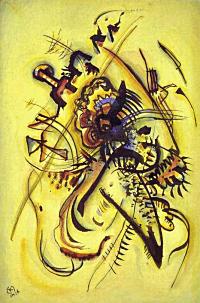
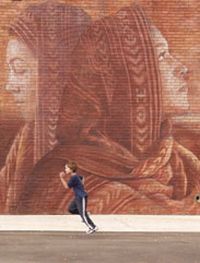 Janus Head
Janus Head

 The Age of Briggs & Stratton
The Age of Briggs & Stratton








































